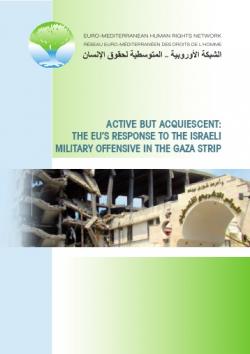Active but Acquiescent: The EU's Response to the Israeli Military Offensive in the Gaza Strip

In view of the Israeli military offensive in the Gaza Strip between 27 December 2008 and 18 January 2009, that took place following the collapse of the six-month ceasefire and which caused an unprecedented level of death and destruction, the Euro-Mediterranean Human Rights Network (EMHRN) has set out to examine the policies of the European Union (EU) towards the conflict. In view of the focus on the EU’s response as a main human rights player on the international scene, this report is mainly concerned with the role and reaction of the EU and its member states rather than of other local or international players in the conflict. For the same reason, because of the EU’s relations with only one actor in the conflict, including binding human rights obligations in its bilateral relations – Israel – and its lack of contact with the other – Hamas – most of the analysis is centred on Israel’s conduct and on the EU’s reaction to it, although the report briefly discusses Hamas’ violations and analyses the EU’s response to these as well. While focusing on the EU’s reactions in the run-up to, the evolution and aftermath of “Operation Cast Lead”, this report begins by setting the wider political, legal and policy context in which the EU’s reactions are constructed and pursued. It outlines the EU’s declared political aims in the Israeli-Palestinian conflict, the human rights and international humanitarian law obligations and commitments of the EU and its member states, as well as the policy instruments the Union has at its disposal. The report then analyses the manner in which the EU has deployed its policies, particularly since 2006, when Hamas won the Palestinian Legislative Council (PLC) elections, arguing that the Union, nolens volens, was part of a wider international context within which the escalation took place. The report then briefly reviews developments during the offensive itself, presenting an overview of the main violations of international humanitarian law. The report then turns to the EU’s reaction during and in the aftermath of the military offensive, suggesting that as relative calm settles, the EU, collectively, finds itself at a crossroads. The Union, driven by domestic and transatlantic interests and allegiances, risks falling back on the same set of failed policies riddled with new ambiguities. However, a growing European unease with developments in the region opens a window of opportunity for the EU to review carefully its relationship with Israel and the Palestinians and to discuss ways of reducing the gaps between human rights and international humanitarian law commitments and policy vis-à-vis the Israeli-Palestinian conflict.
-
Details
Brussels, Euro-Mediterranean Human Rights Network (EMHRN), May 2009, 88 p. -
ISBN/ISSN/DOI:
87-91224-38-1
1. Introduction
2. Setting the Context: EU Objectives, Legal Obligations and Policy Instruments in the Israeli-Palestinian Conflict
2.1. EU policy objectives towards Israel, the OPT and the conflict
2.2. EU and member states’ legal obligations under IHL and IHRL
2.2.1 Member states’ obligations under IHL and state responsibility rules
2.2.2 EU commitments under IHL and IHRL
2.3. EU policy instruments and legal obligations vis-à-vis Israel and the PA
2.3.1 Diplomacy: multilateral and unilateral initiatives
2.3.2 Contractual relations: Association and the European Neighbourhood Policy
2.3.3 Capacity building: aid and the ESDP missions
3. The Deployment of EU Policy Instruments Prior to the Offensive in the Gaza Strip
3.1. Policies between the PA elections and the collapse of the national unity government
3.2. Policies between the collapse of the NUG and “Operation Cast Lead”
3.2.1 “West Bank First”
3.2.2 Tightening the grip on the Gaza Strip
3.2.3 Deepening bilateral relations with Israel
4. Israel’s Offensive in the Gaza Strip: International Humanitarian Law and Facts on the Ground
4.1. Preliminary remarks
4.2. Violations of international humanitarian law committed by Israel
4.3. Violations of international humanitarian law committed by Hamas and other armed groups
4.4. Calls for an investigation and for accountability
5. The EU’s Reaction to the Israeli Offensive on the Gaza Strip
5.1. The EU’s collective response
5.1.1 Diplomacy: unity of purpose, ineffective on the ground
5.1.2 Assistance to the Palestinians: the aid dilemma deepens
5.1.3 Contractual relations with Israel: business as usual?
5.1.4 The EU’s collective response: old dilemmas, new ambiguities
5.2. Consonance or dissonance between the member states?
5.2.1 Unconditionally supportive of Israel: Czech Republic, Germany, Italy and the Netherlands
5.2.2 Adding political nuance to the EU’s stance: France, Spain and the UK
5.2.3 Towards a more balanced approach: Belgium, Ireland, Sweden
5.2.4 Understanding the EU’s response
6. Bridging the gap between the EU’s political preferences and legal obligations and its conduct in practice
Project Background
Executive Summary
List of Abbreviations


